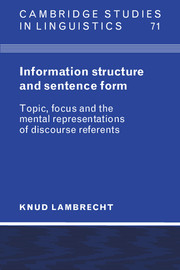 Information Structure and Sentence Form
Information Structure and Sentence Form Published online by Cambridge University Press: 05 June 2012
Definition of topic
Topic and aboutness
Let me begin with a few remarks about what I will not take “topic” to be in this chapter. First, in keeping with the decision to restrict my research to pragmatic phenomena with grammatical, in particular syntactic, correlates in sentence structure (cf. Section 1.1), I will restrict my attention to sentence topics or clause topics. I will have little to say about the notion of discourse topic, which has more to do with discourse understanding and text cohesion than with the grammatical form of sentences (cf. Halliday & Hasan 1976, Ochs Keenan & Schieffelin 1976b, Van Dijk 1977, Reinhart 1982, Barnes 1985, Van Oosten 1985), although I will sometimes informally use that term to designate a topic expression whose referent is pragmatically salient beyond the limit of a single sentence.
Second, I would like to emphasize from the outset that the concept of topic developed here does not coincide with that of topic (or “theme”) as the “element which comes first in a sentence.” In the framework adopted here, sentence-initial elements may either be topics or foci, hence cannot be identified with either of these categories. The notion of topic/theme as the first element in the sentence is extensively discussed in Prague School research (cf. e.g. the summary in Firbas 1966a) and has been adopted e.g. by Halliday (1967) and Fries (1983).
To save this book to your Kindle, first ensure [email protected] is added to your Approved Personal Document E-mail List under your Personal Document Settings on the Manage Your Content and Devices page of your Amazon account. Then enter the ‘name’ part of your Kindle email address below. Find out more about saving to your Kindle.
Note you can select to save to either the @free.kindle.com or @kindle.com variations. ‘@free.kindle.com’ emails are free but can only be saved to your device when it is connected to wi-fi. ‘@kindle.com’ emails can be delivered even when you are not connected to wi-fi, but note that service fees apply.
Find out more about the Kindle Personal Document Service.
To save content items to your account, please confirm that you agree to abide by our usage policies. If this is the first time you use this feature, you will be asked to authorise Cambridge Core to connect with your account. Find out more about saving content to Dropbox.
To save content items to your account, please confirm that you agree to abide by our usage policies. If this is the first time you use this feature, you will be asked to authorise Cambridge Core to connect with your account. Find out more about saving content to Google Drive.